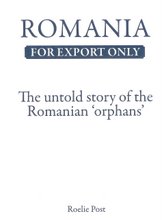Romania - For Export Only
- Council of Europe and EC conference aimed at re-trafficking Romanian children again.
- High Level external pressure
- The Perverse Effects of the Hague Adoption Convention
- When they closed the Romanian “baby shops”
- ‘Ik zit al 22 jaar in een overlevingsmodus’
- A Swedish woman’s search for her Indian mother uncovers another tale of baby snatched at birth
- Adoptie is heel lucratief
- Adoption fra fattige til rige lande skaber flere forældreløse, end den hjælper, mener ngo'en Against Child Trafficking
- Adoption is legalized child trafficking
- Adoption ist legalisierter Kinderhandel
Romania needed to reform its child rights policy, as one of the conditions for its future EU Membership. Large ‘orphanages’ were closed and replaced by modern child protection alternatives.
The author, Roelie Post kept a diary on her work for the
European Commission
that aimed to help Romania reform its child protection.
She soon found out that the
intercountry adoption
system in place was nothing short of a market for children, riddled by corruption. After international criticism this practice was halted temporarily. When redrafting laws, it became clear that in Romania’s reformed child protection there was neither place nor need for intercountry adoptions.
A ferocious lobby that wants to maintain intercountry adoptions stepped out.
The reader is taken along on an eight-year-travel, and will be shown the story of the Romanian ‘orphans’ from a different light, where global politics and private interests compete with the rights of the child.
